Dune and Oil – The Real World Influence Behind Frank Herbert's Dune
While the world of Dune, its inhabitants and culture may seem like a sci-fi story. However, Dune and oil as an industry is more similar than you may think.
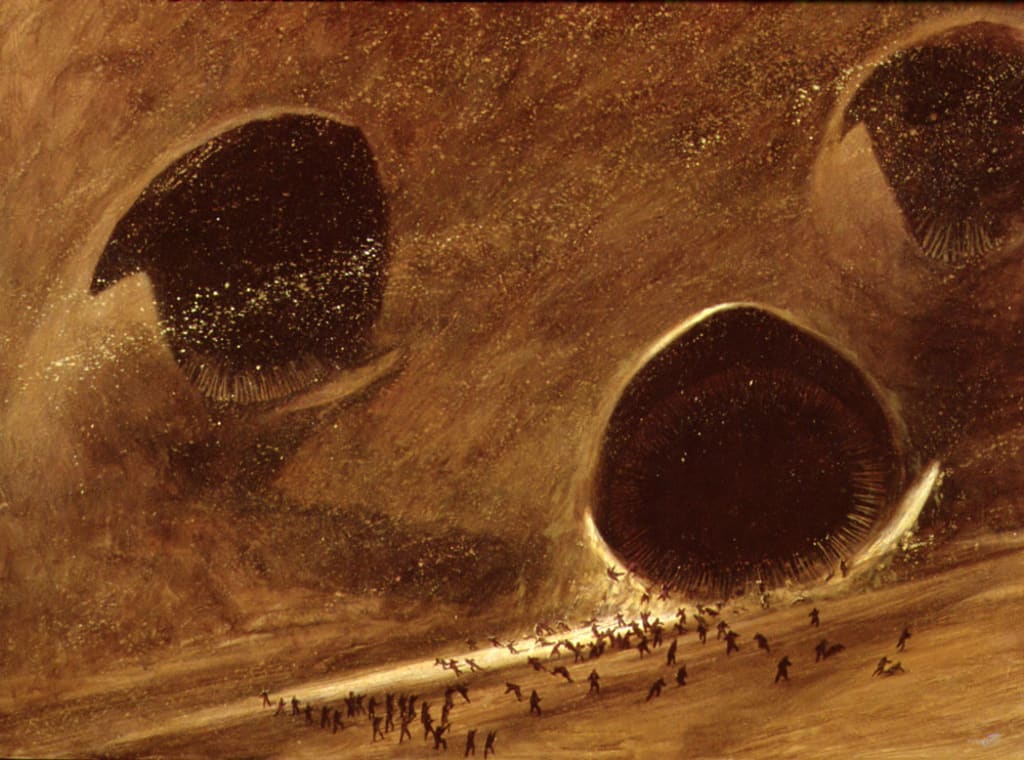
Arrakis. Dune. Desert planet.
With these words, Frank Herbert introduced readers to the far-off reaches of his fictional universe in his seminal science fiction novel Dune. The world features alien concepts like giant worms, elements that fold space, and a race of people whose most valuable commodity is water itself.
While this may sound like a fantastic science fiction story, the truth is that Arrakis is, in many respects, very real. There is a world where leaders fight over an arid, dessert land where fuel lurks below the sand – fuel that, if those warring nations lost, all society would collapse.
We're living in it. Dune and oil are more common than previously thought.
A Desert Planet
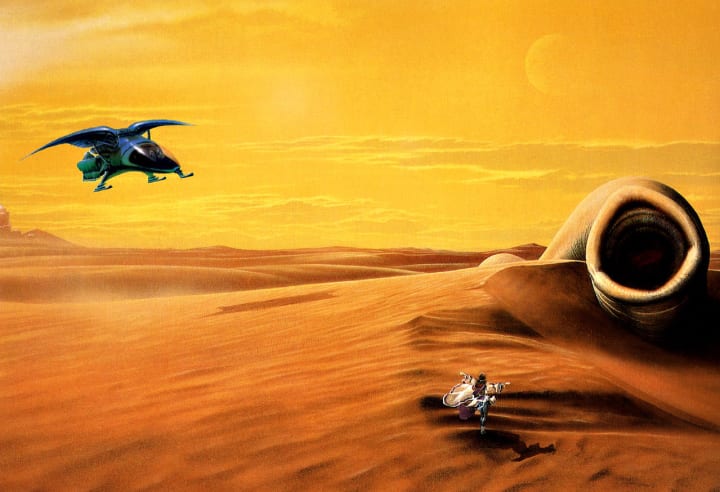
Art by Jim Burns
The Fremen who live on Arrakis see water as the most valuable asset in the world. To spit at someone is the highest praise one can give, as it expends precious water. When a person dies, their body is dehydrated, and the fluid drained filtered and distributed to be consumed. They were special "still-suits" to properly recycle water.
Water is serious business.
This may sound like pure science fiction, but Dune's water focused community draws from science fact. And, as you will see once the link between Dune and oil is established, historical fact.
Before writing his novel, Frank Herbert worked as an environmental scientist, and, in particular, studied deserts. He seemed fascinated by the life that can exist in an almost dehydrated environment. He found that those creatures who could survive were the hardiest, and able to seek out water in the most unlikely of places.
While the sandworms are naturally inclined to survive in Arrakis, humans are aliens to the planet. Even those who live there are, technically, aliens. But the Fremen congregate near underground oasis filled with water, despite the fact that experts believe the entire area to be completely arid.
Compare this to the start of civilization. Sumer, one of the first civilizations in history, formed around the intersection of the Tigris and Euphrates Rivers. Similarly, Egypt first materialized around the Nile River, and stuck fairly close to the area. Greece centered around the Mediterranean. Rome on a Peninsula. These cultures, before expanding into empires, depended on the annual flooding to survive. To them, water became a great part of their life, to the point where every religion regarded water as both a blessing and a curse. Consider this: every religion has a Flood Myth.
So we understand that the Fremen do draw from older human culture, and the planet itself draws from the conditions found in the eroded desert.
But what culture? How do Dune and oil overlap?
Perhaps we ought to go back to the beginning. Back to Sumer. Sumer was located in the Middle East. One day, the lands occupied by this ancient, water dependent kingdom would be referred to by a different name: Iraq.
The Spice Must Flow... Like Oil
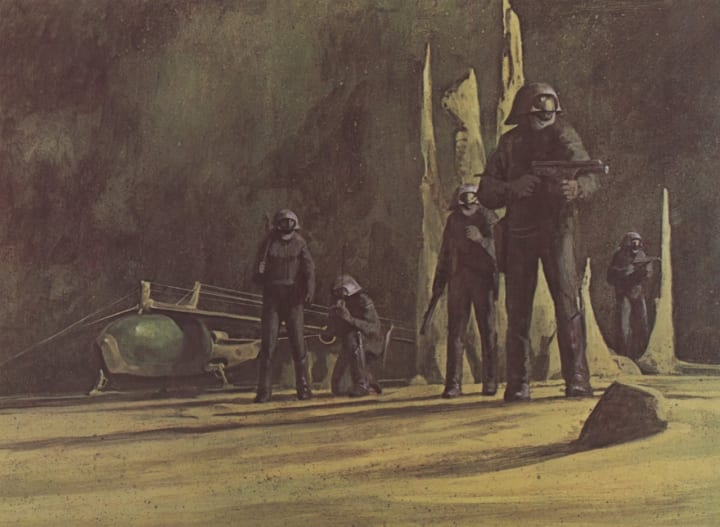
Art by John Schoenherr
Before we understand why the desert country of Iraq became the inspiration of the desert planet Arrakis, we must establish another core piece of evidence. And, yes, this will provide that important link between Dune and oil.
The Spice Melange is a fictional drug and fuel source that, without, the whole universe of Dune could no longer function. Aside from enhancing the capabilities of those who consume it, it also allows the Navigators of the CHOAM Company to fold space. Folding space shortens the distance between two points, allowing ships to travel from one planet to another millions of light years away in an instant. Without this fast travel, the Empire would collapse.
Frank Herbert clearly is drawing from a real life fuel source that, without, entire countries would collapse.
Oil.
And thus, the link between Dune and oil becomes clear.
While alternative fuel sources have risen to prominence in recent years, back in the 1960s, oil was the be-all, end-all energy source. For the first time in human history, people could travel from one end to the world to the other in mere hours, whereas before it might take a year of unreliable, dangerous travel.
Of course, it is easy to declare that the spice, as an energy source, is a metaphor for oil. It's harder to prove that this is what Frank Herbert had in mind when crafting Arrakis.
Arrakis... the New Iraq
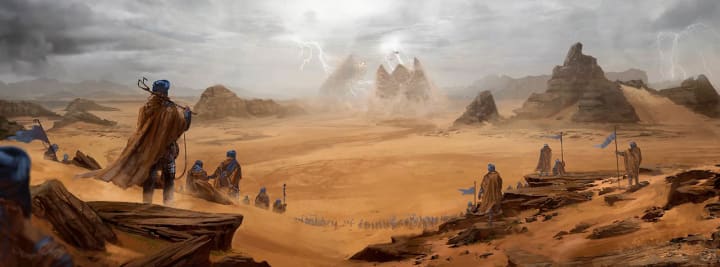
In 1927, a large-scale expedition was sent to search for oil in Iraq. Ever since WWI, oil had been popping up throughout the Middle East. However, it was only after this year that a massive supply of the stuff was found. Refineries were built to harvest the oil, and, in turn, distribute to the world powers.
However, the Iraqi people, who may or may not be employed to refine the oil, saw none of the benefits. The oil coming out of Iraq were distributed between five different parties, and, of those parties, about one-fourth of each fifth went to major companies in the US, Britain, France, and Holland.
None went to the Iraqi people who lived on top of the black gold. Like the Fremen living atop their Spice. Oil and spice. Dune and oil.
This was until 1958, when a coup overthrew the Iraqi monarch who maintained the deal with the other countries. A new company, the Iraqi Patroleum Company, was established. This new company had a complete financial monopoly over the oil.
The United States, fearing that this would be in direct opposition to its financial interests, dispatched 20,000 of its soldiers into Iraq under the orders of President Eisenhower.
But, in the end, the Iraqi Patroleum Company endured, ultimately merging with other Middle Eastern companies, thus leading to the creation of OPEC. The natives, who were once at the mercy of foreign powers, held the heart of global communication and transportation in their hands.
Decades later, they would exercise this power by limiting the oil that reached America. Oil became a rarity in the states, which led to prices skyrocketing, thus profiting OPEC at the cost of the American people. This led to what is known as the 1979 Energy Crisis.
Perhaps the link between Dune and oil needs to be made more clear.
Frank Herbert published Dune in the late 60s, yet the end result of his novel has a dark correlation to what would one day happen. Perhaps because Herbert's Arrakis is in reality a depiction of Iraq from the discovery of oil beneath its dunes to the natives' revolutions against the oppressive, foreign regimes that dared hold domination over it. To Herbert, it probably seemed logical that the once powerless natives would use their power over the country that once held them at their mercy.
Don't believe me? Consider the following.
Arabic Names in Dune

An obvious thing that leaps out to any reader of Dune is how unorthodox all the names are. The Padishah Emperor? The Princess Irulan? The Muad'dib? Jihads? These are not the names you typically expect in science fiction, especially science fiction as old as Dune.
But they aren't as odd sounding if you speak Arabic.
Frank Herbert appropriated numerous Arabic words in his novel to create a foreign society. The word Padishah is actually a Persian title for king. So the Padisha Emperor would literally translate to the Master/King Emperor. The Fremen characters, the natives of the desert planet Arrakis, all have Arabic inspired names. It is very clear that those in power and those at the very bottom both share Arabic sounding names, much like the power structure of Iraq in the 20s to the 50s, where the rich leaders held sway over the masses of Iraqis by making deals with foreign powers.
Dune draws from the Middle East, and oil is drawn from the Middle East. Dune and oil exist, in this sense, as part of a tangled web of Arabic culture.
On that note, it is interesting how the Padishah Emperor Shaddam IV holds sway over Arrakis, yet those who draw out the Spice and hold real control are the royal houses.
While there are numerous houses in Dune, we really focus on two: House Atreides and House Harkonnen. In both situations, members of these royal houses do not have Arabic-inspired names. Their names are distinctly European - much like the European and American countries that held sway over the oil of Iraq.
Oh, and an added kick? The Fremen, whose names are all Arabic-inspired? It's one letter off from being "Freemen." And Arrakis itself sounds so very much like "Iraq."
The Revolutions
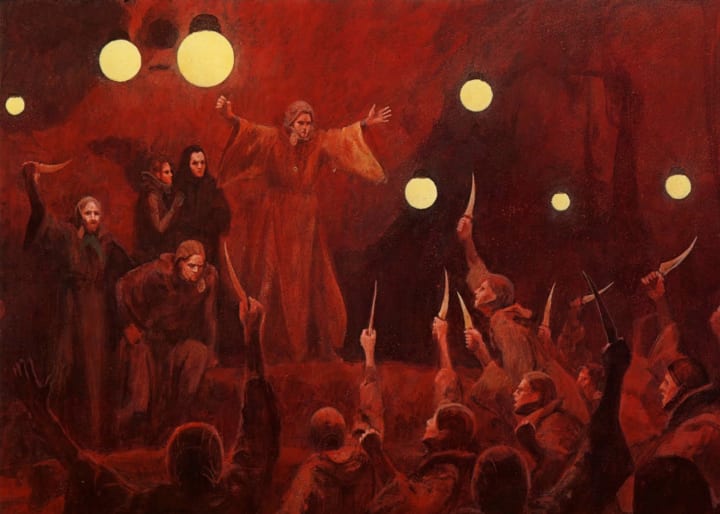
Art by John Schoenherr
Let's return to that 1958 revolution in Iraq. The Iraqi natives led a coup against the powers of the government, overthrew them, and, as a result, had to fight foreign powers who held control over them... though, in the end, they won, and, as a result of their victory, came into power over the oil under their feet.
The events may sound familiar to fans of Dune.
This final link between Dune and oil provides how Frank Herbert truly stood ahead of his time.
In the finale of the novel, Paul Atreides leads the Fremen against the authority of House Harkonnen, then in-command over Arrakis, and the Padishah Emperor, as well as the CHOAM Company itself, which, until this point, had a monopoly over the Spice Melange.
The Fremen destroy House Harkonnen. Paul makes the statement that he can destroy the Spice if he so chose to, and thus, by holding absolute power over the fate of the Spice and the Empire, takes command of the Spice itself.
This leads to the Empire being at his mercy, and, in turn, a great Jihad against the western powers who once dominated them.
A religious war that destroys lives and accomplishes little. As Paul Atreidies acknowledges, "My name has become a killing word."
It is funny how life so frequently reflects fiction. Frank Herbert story correlates to then-recent history, yes, but, like Paul, he captured some of the future as well. Wars would be fought in Iraq over oil. Religious zealots would strike terror and destroy in their fever of wrath.
Harkonnen and Europe. Fremen and Arabics. Desert Planet and Iraq. Dune and oil. Two sides of that same, cultural coin.
Frank Herbert captured something of reality in his science fiction novel, and then proceeded to capture our future along the way.
About the Creator
Anthony Gramuglia
Obsessive writer fueled by espresso and drive. Into speculative fiction, old books, and long walks. Follow me at twitter.com/AGramuglia






Comments
There are no comments for this story
Be the first to respond and start the conversation.